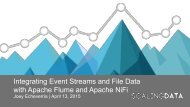NCDS-Summit-2013
NCDS-Summit-2013
NCDS-Summit-2013
You also want an ePaper? Increase the reach of your titles
YUMPU automatically turns print PDFs into web optimized ePapers that Google loves.
Adjudication of Genomic Variants<br />
Discussion Moderator: Martin Reese, PhD, Co-Founder, Chief Executive Officer, and Chairman of the Board, Omicia<br />
Martin Reese is an internationally recognized expert in medical informatics and bioinformatics, with a track record of<br />
bringing grounded scientific knowledge to the corporate sector. Dr. Reese developed gene-finding algorithms for the<br />
Human Genome Project, organized the state-of-the-art Genome Annotation Assessment Project, and was a member of<br />
the Berkeley Drosophila Genome Project, which provided the essential proof-of-concept platform for Celera’s shotgun<br />
sequencing technology.<br />
Overview: The adjudication of variants is complicated by the lack of standards for both phenotype and variant data,<br />
evolving expert consensus on the functional impact of variants, and an absence of high quality, non-proprietary, clinicalgrade<br />
variant databases. There is also a need for new analytical tools to evaluate rare variants, epistasis, and epigenetic<br />
influences.<br />
genomic variant is defined as a change in the nucleotide<br />
base sequence as compared to the base sequence<br />
A<br />
of a reference genome (Figure 4). Annotation of variants<br />
involves the assignment of biological function to genomic<br />
variants; it provides a systematic method for cataloging<br />
multiple sources of genomic data and integrating and<br />
synthesizing those data to determine biological function,<br />
especially with respect to the variant’s impact on clinical<br />
disease. The adjudication of variants refers to the process<br />
through which a consensus is reached regarding annotation<br />
of the functional consequences.<br />
Figure 4. Single Nucleotide Polymorphism (SNP). (Image<br />
reprinted with modification from one openly available at<br />
compbio, http://compbio.pbworks.com/w/page/16252923/<br />
SNPs,%20CNVs,%20and%20SNP%20chip).<br />
Challenges in variant annotation include the accuracy of<br />
variant calling to ensure that sequences are properly aligned<br />
and to determine the location of the variant in the genome<br />
(i.e., intergenic region, intron region, splice site, untranslated<br />
region, coding DNA sequence). Each human genome<br />
contains 1–4 million variants, most of which are likely to<br />
be biologically irrelevant. This presents enormous analytical<br />
and technical challenges to the identification of the few<br />
relevant variants for an individual patient. Challenges in<br />
variant annotation are amplified when the data are of low<br />
coverage or poor quality (e.g., missing data points). Indeed,<br />
high quality, clinical-grade variant databases are rare; most<br />
databases have incomplete data and unacceptable false positive<br />
and false negative rates. Problems related to false positives<br />
and false negatives become more pronounced when<br />
analyzing data from admixed populations because a given<br />
phenotype might be associated with population-specific,<br />
rare genomic variants (Mao et al., <strong>2013</strong>).<br />
In addition, the filtering of artifacts from variant databases<br />
becomes technologically difficult when dealing with massive<br />
data sets. Importantly, the functional significance of<br />
variants is quite difficult to interpret. For example, while it is<br />
straightforward to predict the change in peptide product due<br />
to a variant within a coding DNA sequence, the functional<br />
significance of the altered peptide product may not be clear.<br />
The functional significance of variants located in other genomic<br />
regions is even more difficult to predict. Clinical interpretation<br />
of variants is also complicated by the distinction<br />
between causation and correlation, as well as a publication<br />
bias that severely skews the variants that are published in<br />
the medical literature to those with biological significance.<br />
Further, there’s a lack of expert consensus on the functional<br />
impact of known genomic variants, and the knowledge base<br />
(i.e., published literature, public databases, etc.) is constantly<br />
evolving and growing; thus, if a consensus is reached,<br />
new information will necessitate an evolving consensus,<br />
with unknown downstream effects.<br />
Complicating these issues is the lack of standards for the<br />
storage of variant information. For example, the vcf (Variant<br />
Call Format) file format is the only standard that has<br />
been adopted by the genomics community as a convention<br />
Data to Discovery: Genomes to Health / page 7




